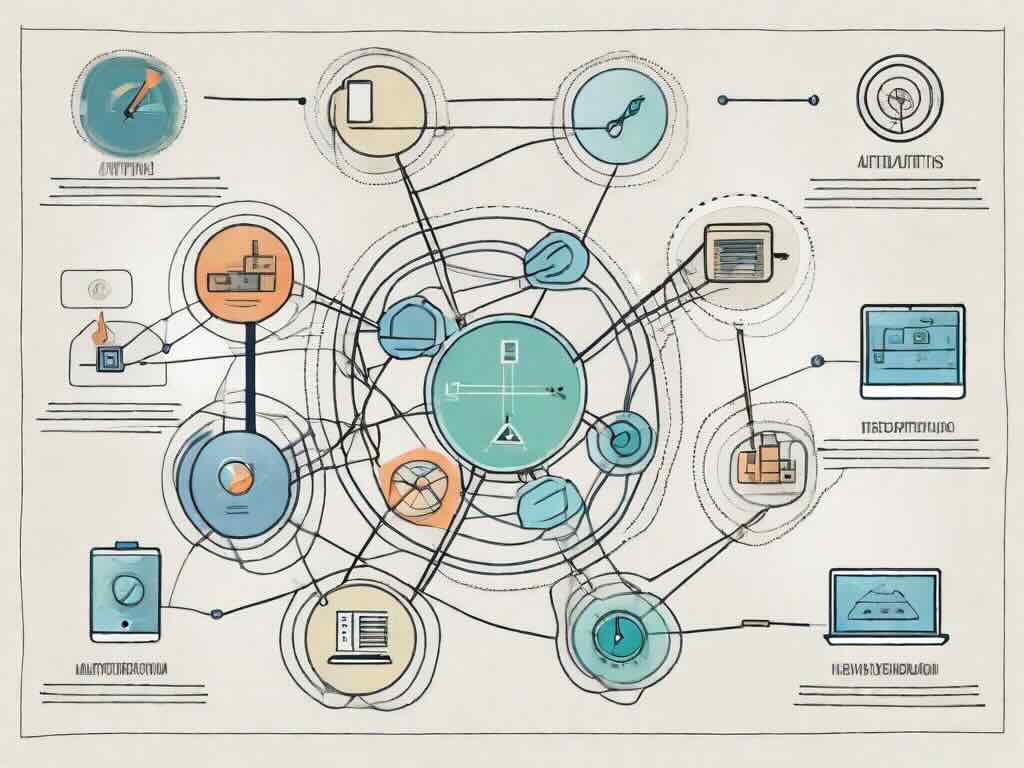
In today’s rapidly evolving technological landscape, it is crucial for professionals in the field of IT audit to keep pace with the latest advancements. However, upon closer examination, it becomes clear that a staggering majority of current IT audit training programs fail to address the changing needs of the industry. In fact, I firmly believe that up to 80% of existing IT audit training is outdated, leaving professionals ill-prepared to tackle the challenges of the modern digital era.
Understanding the Current State of IT Audit Training
Before delving into the reasons behind the outdated nature of IT audit training, it is important to understand its current state. Over the years, IT audit training has evolved, adapting to technological advancements and regulatory requirements.
Today, IT audit training programs are designed to equip professionals with the necessary knowledge and skills to assess and evaluate an organization’s information systems and technology infrastructure. These programs cover a wide range of topics, including risk management, compliance, data analytics, incident response, and cybersecurity.
The Evolution of IT Audit Training
Initially, IT audit training focused on basic technical skills and compliance. Professionals were trained to conduct audits based on established frameworks and guidelines, ensuring that organizations were adhering to industry standards and regulations.
However, as technology advanced and organizations faced more sophisticated threats, the training curriculum expanded to incorporate broad skills. The focus shifted towards risk management, as auditors needed to assess the potential risks and vulnerabilities associated with an organization’s IT infrastructure.
Furthermore, the emergence of big data and the increasing reliance on data-driven decision-making led to the integration of data analytics into IT audit training. Professionals now learn how to leverage data analysis techniques to identify patterns, detect anomalies, and gain valuable insights from large datasets.
Another important aspect that became part of IT audit training is incident response. With the rise in cyber-attacks and data breaches, auditors need to be prepared to handle and mitigate the impact of such incidents. Training programs now include modules on incident response planning, incident investigation, and recovery strategies.
Identifying Outdated Practices in IT Audit Training
One of the main reasons for the outdated nature of IT audit training is the presence of traditional practices that no longer align with the industry’s evolving demands. These practices include reliance on outdated case studies, static training materials, and theoretical approaches that do not reflect real-world scenarios.
While these traditional practices may have been effective in the past, they fail to address the dynamic and rapidly changing nature of technology and cybersecurity threats. Professionals trained under these programs often lack the practical skills necessary to navigate the complex IT audit landscape.
Organizations and training providers are now incorporating more hands-on exercises, real-world case studies, and interactive simulations into their IT audit training programs to address this issue. These approaches allow professionals to apply their knowledge in practical scenarios, enhancing their problem-solving skills and decision-making abilities.
Furthermore, continuous learning and professional development have become essential in the field of IT audit. Professionals are encouraged to stay updated with the latest industry trends, attend conferences and workshops, and pursue certifications to enhance their knowledge and skills.
In conclusion, while IT audit training has evolved over the years, there is still a need for further improvement to keep pace with the advancements in technology and the ever-changing cybersecurity landscape. By embracing innovative training approaches and promoting continuous learning, professionals can better equip themselves to address the challenges of IT audit in the modern era.
The Impact of Outdated IT Audit Training
The consequences of outdated IT audit training are far-reaching and can have a detrimental impact on both individual professionals and organizations as a whole. By failing to keep up with the latest methodologies and technologies, professionals are at a higher risk of making errors, missing critical vulnerabilities, and misinterpreting audit findings.
However, the risks associated with outdated training go beyond mere oversight. In an era where cyber threats are multiplying at an alarming rate, outdated IT audit training leaves professionals ill-equipped to identify and mitigate risks effectively. This puts organizations at risk of data breaches, financial losses, damage to reputation, and regulatory non-compliance.
Consider a scenario where an organization’s IT auditor fails to recognize a critical vulnerability in the system due to outdated training. This vulnerability could potentially be exploited by malicious hackers, leading to a data breach that compromises sensitive customer information. The financial implications of such a breach can be devastating, with the organization facing hefty fines, legal battles, and potential bankruptcy.
Furthermore, the repercussions of outdated IT audit training go beyond financial implications. Customer trust and confidence in the organization’s ability to safeguard their data are also at stake. In today’s digital age, where privacy concerns are at the forefront, organizations must demonstrate their commitment to protecting customer information. Failure to do so can result in a loss of customers, damage to the brand’s reputation, and a decline in market share.
Risks Associated with Outdated Training
While the financial and reputational risks are significant, the consequences of outdated IT audit training also extend to the efficiency of audit processes. Outdated training often leads to the use of manual and time-consuming methods that do not leverage technological advancements.
Consider a scenario where an IT auditor, lacking the knowledge of the latest audit software, spends hours manually reviewing and analyzing data. This inefficient process hampers productivity and increases the time needed to complete audits. As a result, organizations incur higher costs and waste valuable resources on outdated practices.
Moreover, the lack of familiarity with modern audit tools and techniques can hinder the auditor’s ability to provide valuable insights and recommendations to improve the organization’s IT infrastructure. Without up-to-date training, auditors may struggle to identify areas for improvement, leaving organizations vulnerable to future risks and inefficiencies.
The Cost of Inefficiency in IT Audit Processes
Outdated IT audit training poses risks and leads to inefficiencies in audit processes. The use of manual and time-consuming methods that do not leverage technological advancements hampers productivity and increases the time needed to complete audits. This results in higher costs and resources wasted on outdated practices.
Consider a scenario where an organization’s IT auditor, lacking the knowledge of the latest audit software, spends hours manually reviewing and analyzing data. This inefficient process hampers productivity and increases the time needed to complete audits. As a result, organizations incur higher costs and waste valuable resources on outdated practices.
Furthermore, outdated IT audit training can hinder the auditor’s ability to effectively communicate audit findings to stakeholders. In today’s fast-paced business environment, it is crucial for auditors to present their findings in a clear and concise manner. Failure to do so can lead to misunderstandings, delays in implementing necessary changes, and missed opportunities for improvement.
In conclusion, the impact of outdated IT audit training is significant and can have far-reaching consequences. It not only puts organizations at risk of financial losses, data breaches, and reputational damage but also hampers the efficiency of audit processes and inhibits the auditor’s ability to provide valuable insights. Organizations must prioritize continuous training and development for their IT auditors to mitigate these risks, ensuring they stay up-to-date with the latest methodologies and technologies.
The Need for Modernization in IT Audit Training
In order to bridge the gap between the current state of IT audit training and the industry’s requirements, a radical shift toward modernization is imperative.
The field of IT audit is constantly evolving, driven by advancements in technology and the ever-changing landscape of cybersecurity threats. As organizations become increasingly reliant on digital systems and data, the need for skilled IT auditors has never been greater. However, traditional training methods and outdated curricula are no longer sufficient to meet the demands of this dynamic field.
Embracing Technological Advancements in IT Audit
Modern IT audit training must embrace the latest technological advancements, such as artificial intelligence, machine learning, and automation. These tools can streamline audit processes, improve accuracy, and enhance the overall efficiency of the IT audit function. By integrating these technologies into the training curriculum, professionals can develop the skills needed to leverage them effectively in their roles.
For example, artificial intelligence can be utilized to analyze vast amounts of data and identify patterns or anomalies that may indicate potential risks or vulnerabilities. Machine learning algorithms can continuously learn from past audit findings and adapt their approach to uncover new risks. Automation can help automate repetitive tasks, freeing up auditors’ time to focus on more complex and strategic aspects of their work.
By incorporating these technological advancements into IT audit training, professionals can gain a deeper understanding of how to harness the power of these tools to enhance their audit processes and deliver more valuable insights to organizations.
The Role of Continuous Learning in IT Audit Training
Continuous learning is a critical component of modern IT audit training. Professionals must be encouraged and provided with opportunities to stay up-to-date with industry trends, best practices, and emerging technologies. This can be achieved through ongoing training programs, participation in conferences and seminars, and access to industry-specific resources.
Staying current with the latest developments in IT audit is essential to address the ever-evolving cybersecurity landscape effectively. Continuous learning enables professionals to stay ahead of emerging threats, understand new regulatory requirements, and adapt their audit methodologies accordingly.
Moreover, continuous learning fosters a culture of innovation and growth within the IT audit profession. It encourages professionals to explore new ideas, challenge existing practices, and seek out opportunities for improvement. By investing in continuous learning initiatives, organizations can empower their IT auditors to become lifelong learners and invaluable assets to their teams.
In conclusion, modernizing IT audit training is crucial to meet the demands of the rapidly evolving field. By embracing technological advancements and promoting continuous learning, professionals can acquire the skills and knowledge needed to excel in their roles and effectively contribute to the success of their organizations.
Overcoming the Challenges of Updating IT Audit Training
While the need for modernization is evident, updating IT audit training is not without its challenges. As technology continues to advance rapidly, it is crucial for organizations to keep their IT audit professionals up to date with the latest knowledge and skills. However, this process is often hindered by various obstacles that need to be overcome.
One of the main challenges in updating IT audit training is the lack of collaboration between industry experts and educational institutions. Often, there is a disconnect between the theoretical knowledge taught in academic settings and the practical skills required in the industry. Bridging this gap requires organizations to actively engage with experts from both academia and the IT audit field to develop comprehensive and relevant training programs.
Another challenge is the ever-changing nature of technology itself. As new advancements emerge, the training materials must be continuously updated to reflect the latest trends and best practices. This requires organizations to invest in advanced training platforms that can adapt to the evolving needs of IT audit professionals.
Strategies for Implementing Modern IT Audit Training
Organizations must adopt a multi-faceted approach to implement modern IT audit training successfully. This includes collaborating with industry experts, fostering partnerships with educational institutions, and investing in advanced training platforms. Organizations can develop comprehensive and relevant training programs by combining the expertise of industry professionals and academia.
Collaborating with industry experts allows organizations to gain insights into the current challenges and trends in IT audits. These experts can provide valuable input on the skills and knowledge that are most in demand in the industry. By incorporating their expertise into the training programs, organizations can ensure that their IT audit professionals have the necessary skills to address the ever-evolving challenges.
Fostering partnerships with educational institutions is another crucial aspect of implementing modern IT audit training. By working closely with universities and colleges, organizations can align the theoretical knowledge taught in academic settings with the practical skills required in the industry. This collaboration can also help develop internship programs and provide hands-on experience to students, bridging the gap between education and industry requirements.
Investing in advanced training platforms is essential to ensure that IT audit professionals can access up-to-date and interactive learning materials. These platforms can provide a range of resources, including online courses, virtual labs, and interactive simulations. By leveraging technology, organizations can offer flexible and self-paced training options that cater to professionals’ diverse learning styles and schedules.
The Future of IT Audit Training: A Forecast
The future of IT audit training is promising, thanks to the rapid evolution of technology and the growing recognition of the importance of IT audits in today’s digital landscape. In the coming years, we can expect to see a shift towards more dynamic and customized training programs that cater to the specific needs of professionals.
With the integration of emerging technologies, such as artificial intelligence and machine learning, IT audit training will become more interactive and personalized. Professionals will have access to virtual reality simulations that replicate real-world scenarios, allowing them to practice their skills in a safe and controlled environment.
Continuous learning will also play a crucial role in the future of IT audit training. As technology advances, professionals must stay updated with the latest trends and best practices. Organizations must provide ongoing training opportunities, encourage professionals to pursue certifications and attend industry conferences to enhance their knowledge and skills.
Real-world case studies will become integral to IT audit training, allowing professionals to apply their knowledge to practical scenarios. By analyzing and solving complex problems, professionals will develop critical thinking and problem-solving skills that are essential in the field of IT audit.
In conclusion, the outdated nature of current IT audit training is a pressing issue that needs immediate attention. Organizations and professionals must recognize the need for modernization and take proactive steps to bridge the gap between training and industry requirements. Only by embracing the latest advancements, continuously learning, and adopting a forward-thinking approach can we ensure the effectiveness and relevance of IT audit training in the ever-changing digital landscape.






